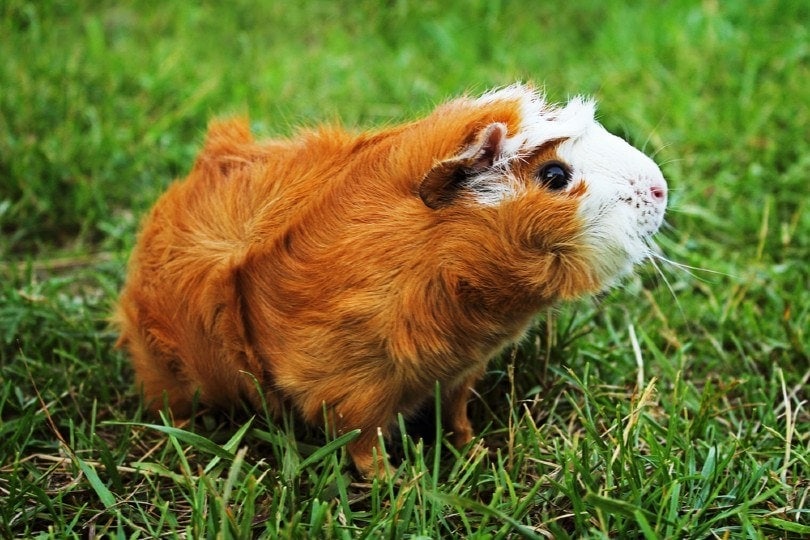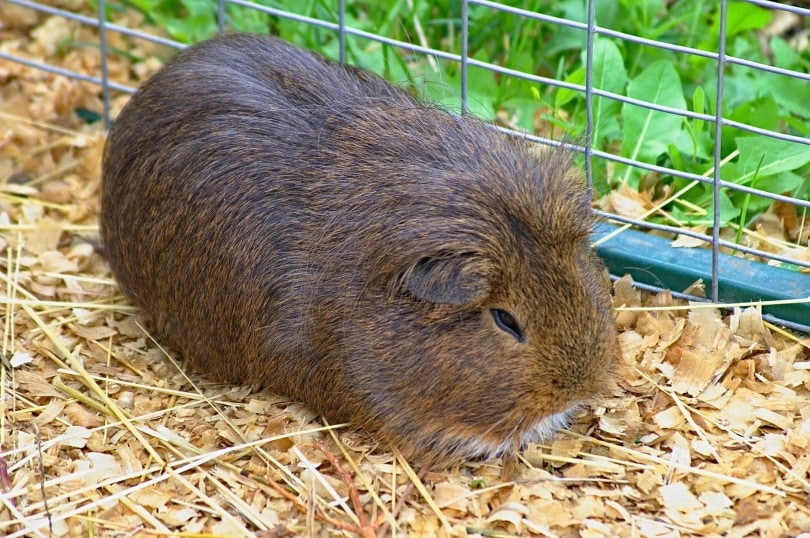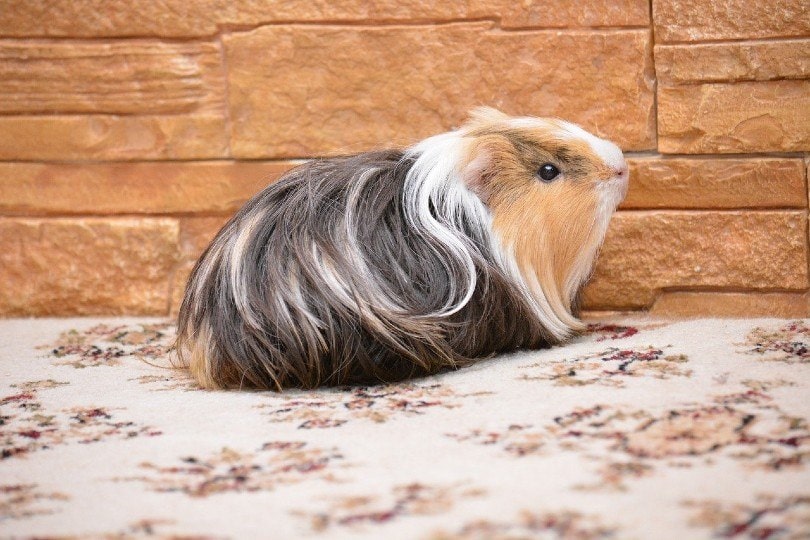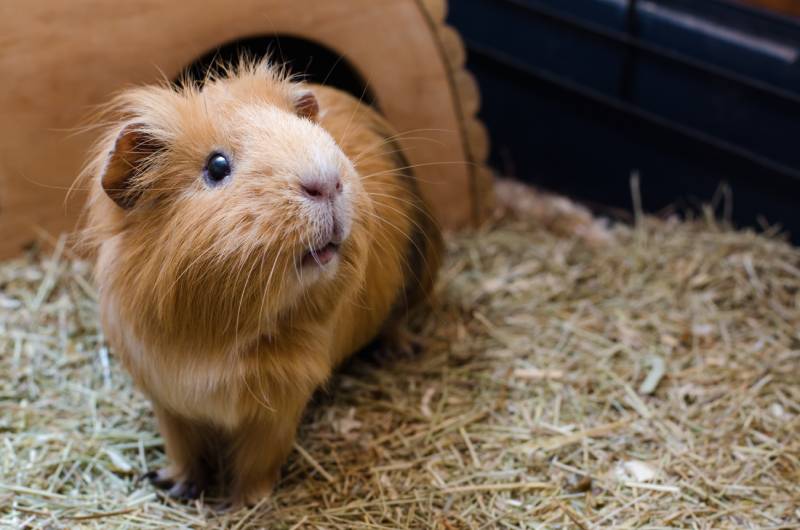Do Guinea Pigs Shed? How Much & How Often
By Beth Crane
Updated on

Guinea Pigs, or cavies, are the South American pets that captured the hearts of many animal lovers worldwide. These hairy rodents come in different breeds; some have long flowing coats, and some have none! All Guinea Pigs shed their fur in larger amounts, usually around twice a year. However, Guinea Pigs will shed a small amount of hair year-round, so grooming is needed to keep them comfortable.
What Guinea Pigs Shed?
All breeds of cavy will shed hair. Hair loss is a natural process that keeps their coats in the best condition possible. Even hairless Guinea Pigs (affectionately called “Skinny Pigs”) will shed some of the soft, fine, downy hair that covers their bodies. Long-haired breeds, such as the Peruvian, Texel, or Silky Guinea Pig, can shed more than shorter-haired breeds, but all cavies will shed their hair at some point.
Why Do Guinea Pigs Shed Their Fur?
Shedding is a normal and beneficial process that most haired mammals go through (including humans). Shedding can be in response to different stimuli, such as changes in temperature and the seasons or hormonal changes like pregnancy. Genetics play a part in how much an individual Guinea Pig might shed, as there can be changes to how long each one of the three main “phases” of hair growth lasts in each cavy.
The three phases (anagen, catagen, and telogen) represent hair growth, maintenance, and shedding phases. In the growth phase, new hairs will grow out of the skin to a certain length determined by genetics. The second phase is how long your Guinea Pig goes before shedding, and the third phase is the shedding of the old hairs themselves before new hairs take their place.
Other times, Guinea Pigs can shed their hair for medical or age-related reasons. For example, a baby Guinea Pig will shed its coat and grow in a rougher adult coat when they wean from their mothers.

How Much Do Guinea Pigs Shed? How Often?
Guinea Pigs will likely shed a few hairs a day, similar to humans. Even long-haired Guinea Pigs will shed, but the breed depends on how often and how much their larger shedding periods may be. For example, many Guinea Pigs shed more in the spring and fall as their coats prepare for the temperature change. In the fall, the lighter spring coat will melt out and be replaced by a denser coat to protect them from the cold of winter.
In the spring, this dense coat will fall out to be replaced with a lighter one for summer. Not all Guinea Pigs will have a defined shedding season, like long-haired breeds, but most will shed noticeably more often during these periods.
It’s essential to brush your Guinea Pigs while they’re shedding. Guinea Pigs are susceptible to heat exhaustion and overheating, so helping them get rid of their thicker winter coats is important. In addition, you’ll likely notice clumps of old fur stuck in your cavy’s coat during their molt, which can trap heat and make it harder for them to cool off. By brushing them daily during this time, you can pull out this fur and help to keep them at a good temperature.
Long-haired Guinea Pigs will need additional care when shedding, as many long-haired breeds don’t have shedding seasons. Long-haired breeds such as the Peruvian also have hair that doesn’t stop growing, so it will need cutting to keep it from tangling in their legs and making them overheat in the warmer months.
What Can Cause Excess Shedding in Guinea Pigs?
Shedding is a normal part of coat maintenance for guinea pigs. Most breeds will shed a few times a year and lose a small amount of hair daily. However, some Guinea Pigs may seem to lose more than just a few hairs and may even end up with bald spots!
Alopecia, or the absence of hair where hair should be, is a problem that can be caused by excessive hair loss. Common reasons for alopecia or abnormal hair loss in Guinea Pigs include:
- Vitamin C deficiency
- Self-barbering/being barbered by another cavy
- Mites or other skin parasites
- Pregnancy-related changes
- Hyperadrenocorticism (Cushing’s disease)

Vitamin C and Alopecia
Vitamin C is vital for Guinea Pigs. Unfortunately, they cannot make it in their bodies themselves, so they must have it supplemented in their diet. A major cause of excess hair loss in Guinea Pigs is a lack of vitamin C (scurvy), which can also cause other signs such as excessive bruising, crusts and lesions on the skin, pain, and stiffness.
It can even be fatal if not treated effectively! Alopecia is often the first sign, so if your Guinea Pig seems to be shedding a lot and you see bald spots, take them in to see your vet as soon as possible for an exam.
How Can I Stop My Guinea Pig From Shedding So Much?
Guinea Pigs are small animals, so the amount they shed should be minimal except for during their shedding seasons. If you feel your Guinea Pig is shedding excessively or more than normal, we advise you to take them to your vet for a check-up. However, if your cavy has a clean bill of health and you still find yourself picking loads of hair off your clothes daily, there are a couple of ways to reduce their shedding.
The first way is to groom them more regularly. Guinea Pigs that are used to being groomed often enjoy it, and it can present a good chance to bond and remove shed hair. Make sure you use a brush that’s suitable for small pets, and don’t bathe them unless necessary to remove tangled or runny poop from their backsides.
The other way you can potentially stop your Guinea Pig from shedding so much is to ensure they get all the nutrition they need from a balanced diet. Guinea Pigs need Vitamin C in spades and other nutrients such as minerals and fiber. A Guinea Pig needs a diet of high-quality hay, a small number of pellets, some leafy greens, and a very small amount of fruits for a treat. If you think your cavy may be suffering from a nutrient deficiency, it’s important to seek advice from your vet regarding their diet.

Final Thoughts
Guinea Pigs are (normally) covered in coarse or flowing fur. Like most mammals, this hair has its own “life cycle” that helps it grow to a certain length, stay for a certain time, and fall out. Guinea Pigs shed daily but only lose a small amount of hair. Some breeds of Guinea Pigs (particularly short-haired breeds) will have shedding seasons where more fur than usual falls from the coat.
These usually occur in spring and fall to prepare the guinea Pig for the temperature change. However, Guinea pigs should never lose hair to the point of thinning or baldness. If this happens, there’s likely something else going on that should be checked by your vet.
Featured Image Credit: Tettania, Shutterstock












